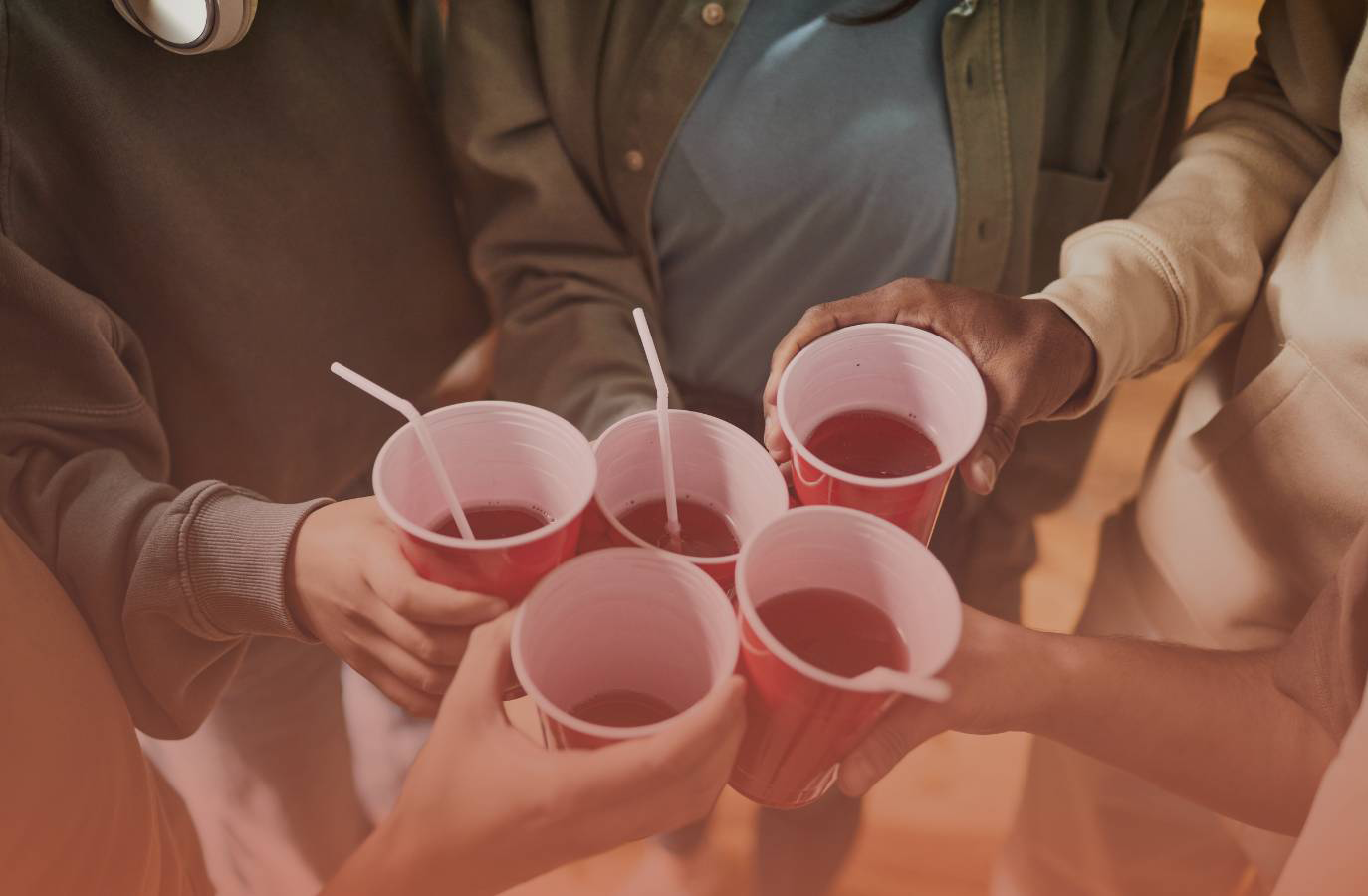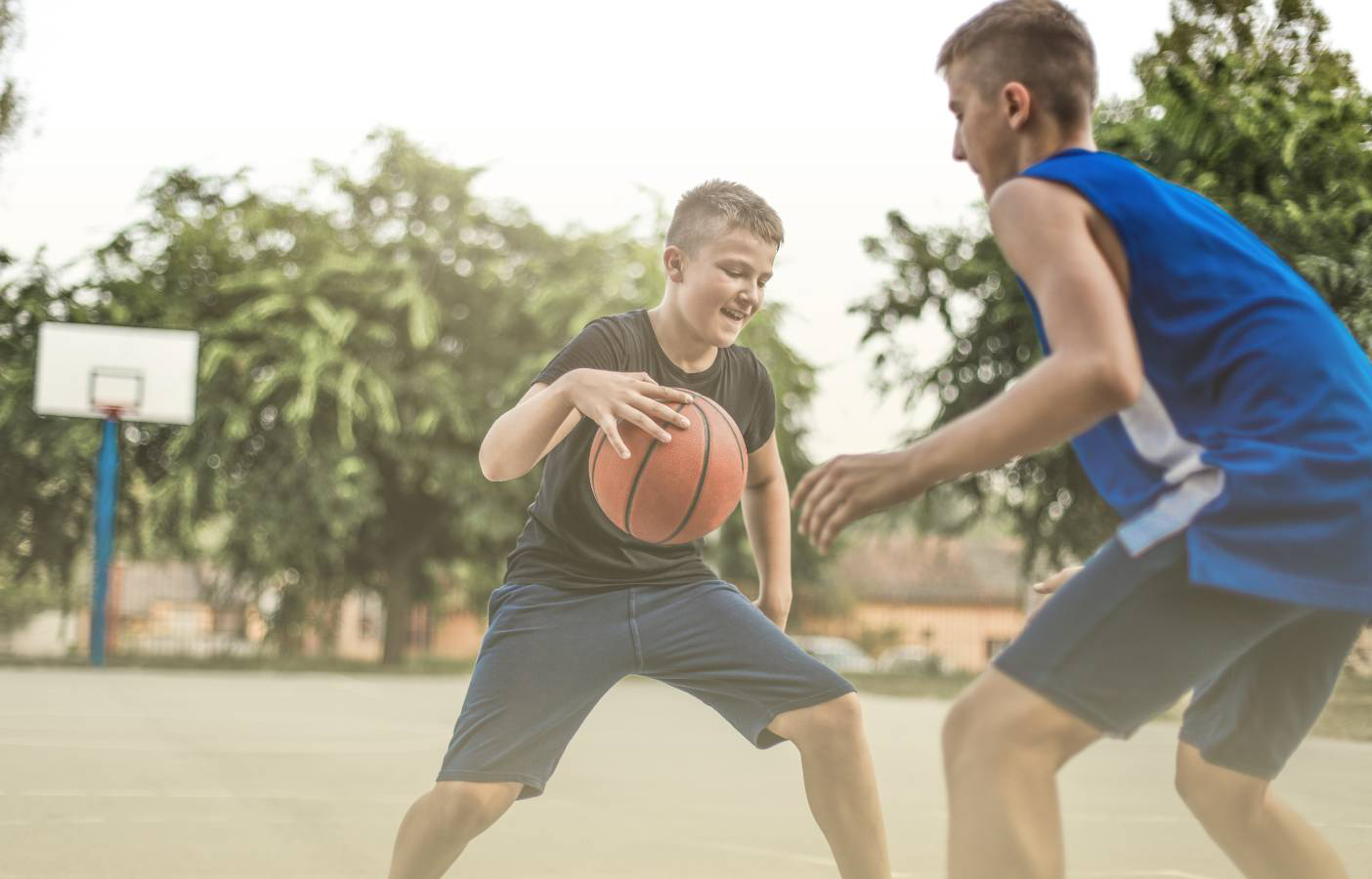It can sometimes be hard to talk to a parent or other adult in your life when you have questions or concerns about alcohol or other substances, gambling, mental health, or thoughts of suicide.
Your Life Iowa is here for you. Call, text or chat any time. No judgement. Just help. Our services are free and available 24/7.
Connect now with a caring and knowledgeable YLI counselor from your phone, tablet or computer. We do not require parental permission for use of our phone, text or chat services.

An Iowa Youth Survey1 found that half of all 11th graders in Iowa reported drinking alcohol at some point. It's possible that you or your friends have considered trying alcohol or have already tried it before.
It's important to know that there are many risks associated with underage drinking, alcohol affects many parts of the human body, wherever water goes alcohol goes too.2 This means that regardless of age alcohol is associated with many serious health risks.
Hangovers
Hangover is the term used for the negative aftereffects of consuming too much alcohol. Hangovers are caused by many factors such as dehydration, exposure to acetaldehyde (the toxin alcohol produces in your body) and mini withdrawal from the effects of alcohol on the brain.3
Symptoms of a hangover include nausea, vomiting, headaches, anxiety, muscle aches, fatigue, weakness, sweating, light sensitivity and more.
Short Takes With NIAAA: What Are Hangovers?
Binge Drinking
Binge drinking is defined as having 4 or more drinks for women and 5 or more drinks for men in roughly 2 hours. In youth, however, binge drinking is defined as only 3 drinks for girls and 3-5 drinks for boys.4
Binge drinking accounts for 90% of all alcohol consumed by teens.5 There are many risks associated with binge drinking, including:6
Risks associated with binge drinking
- Higher risk of acute harm, such as blackouts or overdoses
- Higher risk of unsafe sexual behavior, sexually transmitted infections and unintentional pregnancy
- Increased risk of violence, falls, burns, drownings, and car crashes
- Increased risk for certain diseases and cancers
Alcohol Poisoning
Alcohol overdose causes areas of the brain that are important for supporting life to shut down. These areas are important to control breathing and heart rate. Alcohol poisoning is extremely dangerous and can lead to impaired brain function and even death. If you think someone may be experiencing alcohol poisoning, seek medical attention immediately.7,8
Symptoms of Alcohol Poisoning
- Unconscious
- Vomiting and seizures
- Clammy or sweaty skin
- Slowed and irregular breathing
- Low body temperature
- Skin is pale and blue
What to do
- Seek medical attention right away
- Stay with them, DO NOT leave them alone
- Turn them on their side to prevent choking
- Try to keep them conscious
- Make sure they stay warm
- Recall details about the person and how much they drank
Consequences of Underage Drinking
While drinking may have many negative effects on a person's health like increasing risk for certain cancers and liver disease, there are many other risks associated with underage drinking. Some of the risks include:
- Doing poorly in school (teens who drink alcohol are more likely to get bad grades than teens who don't)
- Increased risk for depression and anxiety
- Poor decision making (teens who drink are more likely to engage in other risky behaviors)
- Risky sexual activity (underage drinking is associated with a higher risk of risky sexual behavior like unprotected sex, and being sexually active at a younger age)
Possible legal consequences like minor in possessions (MIP) could keep someone from being able to play sports or be in other extracurricular activities
Addiction: Types, Causes, and Solutions (Teens)
Resources
Tips for Teens: Underage Drinking
Substance Abuse and Mental Health Services Administration (SAMHSA) PDF with information about underage drinking.
Underage drinking facts
CDC webpage on drinking levels and consequences among youth.
Underage Drinking at Parties: Consequences for Teens
Talk It Out article about risks of underage drinking and how to help your teen.
Citations
1. Endres, Kyle, Ki Park, Mary E. Losch, Justine Radunzel & Erin O. Heiden. (2022). 2021 Iowa Youth Survey State Report. Cedar Falls, IA: Center for Social and Behavioral Research, University of Northern Iowa.
2. "How is Alcohol Absorbed into the Body?" The Alcohol Pharmacology Education Partnership.
3. "Alcohol's Effects on Health: Hangovers." National Institute on Alcohol Abuse and Alcoholism.
4. "Alcohol's Effects on Health: Understanding Binge Drinking." National Institute on Alcohol Abuse and Alcoholism.
5. "Alcohol's Effects on Health: Get the Facts About Underage Drinking." National Institute on Alcohol Abuse and Alcoholism.
6. "Understanding Binge Drinking." National Institute on Alcohol Abuse and Alcoholism.
7. "Alcohol's Effects on Health: Understanding the Dangers of Alcohol Overdose." National Institute on Alcohol Abuse and Alcoholism.
8. "Alcohol Poisoning." Cleveland Clinic.
 According to an Iowa Youth Survey1, 16% of Iowa teens reported ever using marijuana. Experimenting with drugs is never safe and could have lifelong or even deadly consequences.
According to an Iowa Youth Survey1, 16% of Iowa teens reported ever using marijuana. Experimenting with drugs is never safe and could have lifelong or even deadly consequences.
All it takes is one time to become addicted or to overdose.
Your Life Iowa is here to give you the knowledge and resources you need to understand unsafe drug use and where to find help if you or someone you know is misusing drugs.
Signs of problem drug use
- Withdrawal symptoms like feeling shaky, sick or restless
- Increase privacy or trying to hide their use
- Have tried quitting but can't
- Drug use interferes with school or work
- Give up things they used to enjoy doing
- Changes in physical appearance and/or poor hygiene
- Engaging in more risky sexual behaviors
Marijuana
You could lose a lot if you smoke weed
Marijuana has become one of the most commonly used illicit drugs in the United States.2 Although it has been legalized in some states marijuana is illegal in Iowa and at the federal level and poses many dangerous threats and side effects, especially for teens.
Research shows that frequent marijuana use before the age of 18 increases your chances of developing a physical dependence from 1 in 10 to 1 in 6. Regular marijuana use starting at a young age can also increase the chances of low IQ and experiencing mental health problems.2 Teens who use marijuana are less likely to graduate high school and get college degrees.3
Driving while using marijuana is also illegal and extremely dangerous due to the fact it distorts perception, slows reaction time and impairs coordination.4 It could result in an OWI (operating while under the influence), limiting your ability to drive legally, get to work or school, and more.4
Prescriptions Drugs
Teens often misuse prescription drugs for many different reasons. Whatever the reason, taking prescription drugs without a doctor's prescription or taking more than the doctor recommended amount is dangerous.
Prescription stimulants increase brain activity and are oftentimes used to treat Attention Deficit Hyperactivity Disorder. Side effects of these drugs are seizures, irregular heartbeat, decreased blood flow and even heart failure or cardiac arrest.5
Prescription depressants are the opposite of stimulants; they slow brain activity. These drugs are prescribed to treat anxiety disorders, insomnia, and seizures. They are often abused due to their calming effects. Side effects of depressants include slowed breathing, low blood pressure, poor motor coordination, blurred vision and lightheadedness.
Opioids
Opioids are painkillers, commonly known prescription opioids are morphine, hydrocodone and oxycodone. Side effects of opioids include depression, confusion, slowed breathing, drowsiness, dizziness and nausea.6
In one two-year period, adolescent fentanyl-related deaths increased by 350%. The study also found that fentanyl was associated with 77% of adolescent overdose deaths.7 Fentanyl is a synthetic opioid 50 times stronger than heroin and 100 times stronger than morphine.8 It is often found in other drugs like marijuana, cocaine, fake pills and many more. You may not even realize a drug contains fentanyl until it's too late.
Naloxone saves lives. Naloxone is a medication used when someone is experiencing an opioid overdose. Naloxone can reverse an opioid overdose by binding to opioid receptors and blocking the effects of opioids.9 Learn how to recognize an opioid overdose, what to do in the event of an overdose.
How Naloxone Saves Lives in Opioid Overdose
Iowa’s Good Samaritan Law
As a teen, you may be hesitant to call for help if someone is having an overdose because you worry about getting yourself in trouble, too. Iowa's Good Samaritan Law protects you from legal prosecution if you report an overdose immediately to medical professionals and stay with the victim until assistance is provided. We encourage you to get help for someone you think may be having an overdose. Learn more here.
Resources
Tips for Teens: Marijuana
Substance Abuse and Mental Health Services Administration (SAMHSA) PDF on how marijuana can negatively impact teens.
Tips for Teens: Steroids
Substance Abuse and Mental Health Services Administration (SAMHSA) PDF on how steroids can negatively impact teens.
Tips for Teens: Methamphetamine
Substance Abuse and Mental Health Services Administration (SAMHSA) PDF on how methamphetamine can negatively impact teens.
Mind Matters Series | National Institute on Drug Abuse (NIDA)
NIDA article on the scientific impact of drugs on the brain, aimed at teens.
Citations
1. 2021 Iowa Youth Survey State Report. Iowa Department of Public Health, University of Northern Iowa, 2021.
2. Learn About Marijuana Risks: Know the Risks of Marijuana. Substance Abuse and Mental Health Services Administration.
3. Marijuana and America's Health: Questions and Issues for Policy Makers. National Institute on Drug Abuse, 2019.
4. Cannabis and Driving. Centers for Disease Control and Prevention.
5. Prescription Stimulant Misuse and Prevention Among Youth and Young Adults. Substance Abuse and Mental Health Services Administration.
6. Prescription Opioids DrugFacts: What are prescription opioids? National Institute on Drug Abuse.
7. Opioid overdose deaths among teens have skyrocketed due to fentanyl. ABC News, 2022.
8. Fentanyl Facts. Centers for Disease Control and Prevention.
9. Lifesaving Naloxone. Centers for Disease Control and Prevention.

Around 25% of Iowa teens in 11th grade reported having vaped or used an e-cigarette before.1 Just because it's popular doesn't mean it's safe. Vaping is more dangerous than you think.
It's never too late to quit vaping. If you or someone you know is struggling with vaping reach out to Your Life Iowa or use a quitline like MyLifeMyQuit for support.
Risks of Vaping
Vaping isn't harmless. More than 2,800 people have been hospitalized with an e-cigarette or vaping-related lung injury, including deaths in 29 states.2,3
- Increased risk for developing other substance use or addiction disorders
- Impacts creation of synapses in the developing brain
- Secondhand smoke exposure
- Associated with poor mental health outcomes
- Exposure to many cancer-causing chemicals
- Lung damage and lung scarring
- Other organ damage like heart damage, narrowing arteries and raised blood pressure
Tips to help you quit
We know that it can be difficult to quit using tobacco products. Support is available to help you start and maintain your choice to stop vaping.4,5
- Visit MyLifeMyQuit, Iowa's teen-centered program to help you quit smoking
- Tell a friend or family member to keep yourself accountable
- Stay busy or find distractions you enjoy
- Exercise and be active
- Talk to a healthcare professional
- Know your triggers and do your best to avoid them
- Know your reason for quitting
What happens when you call a quit line?
It can be helpful to know what can happen when you call a quit line or crisis line. This video can help you feel prepared to reach out.
Quitlines: Helping You Quit Smoking for Good.
Resources
Tips for Teens: E-Cigarettes
Substance Abuse and Mental Health Services Administration (SAMHSA) PDF on how e-cigarettes can negatively impact teens.
Know the Risks: E-Cigarettes & Young People
U.S. Department of Health and Human Services website with information for teens, family and friends on e-cigarettes and related health risks.
How to Quit Vaping
Smokefree Teen webpage to help teens create a plan to quit vaping.
My Life My Quit
Website with adult and teen-specific resources to help quit vaping, tobacco or nicotine products.
Citations
1. 2021 Iowa Youth Survey State Report. Iowa Department of Public Health, University of Northern Iowa, 2021.
2. CDC: Vaping-related lung injuries linked to 64 deaths, 2,758 hospitalizations. American Academy of Pediatrics.
3. Vaping (E-Cigarettes). Cleveland Clinic.
4. How to Quit Vaping. Smoke Free Teen.
5. 7 Common Withdrawl Symptoms And What You Can Do About Them. Centers for Disease Control and Prevention.
 Despite gambling being illegal for those under the age of 21, more than half of teens gamble. Iowa data shows over 20% of teens had bet on sporting events and 25% had played card or dice games.1
Despite gambling being illegal for those under the age of 21, more than half of teens gamble. Iowa data shows over 20% of teens had bet on sporting events and 25% had played card or dice games.1
Gambling for teens can be riskier than for adults, because teens have twice the rate of problem gambling compared to adults.2
When does gambling become a problem?
For people who practice low-risk gambling guidelines, gambling can be a form of entertainment that doesn't negatively impact their life.
What Slot Machines Can Tell Us About Our Brains
Gambling activities that fall under the category of low-risk gambling
These behaviors can indicate that your gambling is considered "low-risk."2
- Has a set amount of money and stops when it’s gone
- Avoids large bets and high stakes
- Only gambles with friends or in social settings
- Only care to have fun and don't worry about the money or losing
Signs that you may be experiencing problem gambling include
These behaviors can indicate that your gambling may be negatively impacting your life.2
- Placing increasingly large bets
- Borrowing money or changes in financial situations
- Feeling restless when not gambling
- Constantly thinking about gambling
- Trying unsuccessfully to stop gambling
Risk Factors
These risk factors may increase the chances of problem gambling.3,4
- Starting to gamble from a young age, studies show that children who gamble are 4 times more likely to struggle with problem gambling when they get older
- Being male - men are more likely to suffer from problem gambling than women
- Personality traits such as being impulsive, highly competitive, workaholic, and easily bored/restless
- Living near casinos or gambling venues
- Struggling with a substance abuse disorder or other mental health disorders like anxiety, depression, obsessive-compulsive disorder, attention deficit hyperactivity disorder, or personality disorders
- Having a parent or family member who struggles with problem gambling
Sports Betting
Sports betting has become increasingly popular in Iowa in recent years. Mobile betting apps make it easier for teens to access illegal gambling. However, betting on sporting events poses the same risks as "traditional" gambling, including financial problems, relationship problems, declining work/job performance, and more. Your Life Iowa can help.
If your sports betting is getting out of control, we’re on your team
Payout Wizard
Try the Payout Wizard to see how much you'll lose on average while gambling.
Resources
YLI Problem Gambling Brochure
Your Life Iowa brochure about problem gambling that can be printed on your own.
Compulsive Gambling
Mayo Clinic webpage with information on compulsive gambling symptoms and causes.
Youth Gambling Addiction eBook
Know the Odds ebook titled "The Dangers of Youth Gambling Addiction."
Citations
1. 2021 Iowa Youth Survey State Report. Iowa Department of Public Health, University of Northern Iowa, 2021.
2. High School Gambling Fact Sheet. HC DrugFree.
3. What are the odds your teen is gambling? Your Life Iowa, 2022.
4. Compulsive Gambling. Mayo Clinic.
 The teen years can be difficult. Sometimes, they can also include thoughts of suicide. Nearly 1 in 4 Iowa teens reported having thoughts of suicide.1
The teen years can be difficult. Sometimes, they can also include thoughts of suicide. Nearly 1 in 4 Iowa teens reported having thoughts of suicide.1
Many people have thoughts of suicide. If you or someone you know is having suicidal thoughts you’re not alone. Don't hesitate to get help now.
Suicide affects many people
Research shows that when someone dies by suicide it affects an entire community, for every 1 suicide 135 people who are affected that knew that person. Exposure to suicide can increase a person’s risk for developing anxiety, depression, post-traumatic stress disorder (PTSD) and suicidal ideation.2
Warning signs to recognize
People who are thinking about suicide may express at least one warning sign. It's important to know what to look for so you can ask for help or support a loved one. Warning signs can include:3
- Talking about wanting to harm or kill themself
- Saying things like “I wish I were dead” or “I wish I was never born”
- Giving away belongings
- Self-isolating and withdrawing from social activities
- Increased substance use
- Sleeping too much or too little
- Loss of interest in things that used to bring them joy
- Anxiety/depression/agitation and extreme mood swings
- Feelings of hopelessness or being a burden to others
- Looking for ways to kill themselves ex. buying a firearm
Talking to someone you think might be considering suicide
It may seem intimidating to talk about thoughts of suicide with a friend or loved one. We can help you know what to say and what to do.4,5
Do
- Take them seriously
- Ask them clearly and directly if they are thinking of suicide
- Ask questions and offer words of encouragement
- Be supportive and listen
- Connect them to help, such as Your Life Iowa
Don't
- Brush off their feelings
- Ask indirectly by saying things like “Are you thinking about hurting yourself?” or “You're not thinking of doing something silly are you?”
- Promise to keep it a secret
- Leave them alone
- Assume someone else will reach out
If you are having thoughts of suicide or talking to someone who is, reach out for support NOW. All thoughts of suicide should be taken seriously. Call 988 or Your Life Iowa at (855) 581-8111.
Grieving a loved one who died by suicide
You may feel many emotions if you’ve lost someone to suicide. It's normal to feel sad, upset, and even angry. There's no right way to feel. Losing someone to suicide is very sad and difficult. Suicide impacts many people; it can affect entire schools and communities. It's important to know that you're not alone.
It's important to know that you're not alone. Your Life Iowa is here to support you or a loved one following a suicide loss. Call or text 988, or call Your Life Iowa at (855) 581-8111, to talk to a counselor any time, 24/7.
Resources
American Foundation for Suicide Prevention
National suicide prevention resource with information and support for teens and adults.
988 Suicide & Crisis Lifeline
Website for national hotline, including information and support for teens and adults who are experiencing thoughts of suicide or are concerned about a loved one.
Suicide Prevention
CDC webpage on suicide prevention, including statistics, risk factors and prevention strategies.
Citations
1. 2021 Iowa Youth Survey State Report. Iowa Department of Public Health, University of Northern Iowa, 2021.
2. Suicide in Iowa. Iowa Substance Abuse Brief: Suicide in Iowa, June 2022.
3. Risk factors, protective factors, and warning signs. American Foundation for Suicide Prevention.
4. Help Someone Else. 988 Suicide & Crisis Lifeline.
5. If Someone Tells You They're Thinking About Suicide. Talk Away the Dark.
 Being a teen can be hard. Expectations at school and home, complicated relationships, extracurriculars or sports and more can create stress that is difficult to navigate.
Being a teen can be hard. Expectations at school and home, complicated relationships, extracurriculars or sports and more can create stress that is difficult to navigate.
Mental health impacts everyone, regardless of mental illness or personal experiences. Your Life Iowa wants to help you learn about your mental health and how you can care for it.
Taking care of your mental health
It's important to take care of your mental health regularly. This can help you feel better and be better able to manage stress when it happens.
- Go for a walk or get some exercise
- Talk to a friend or family member
- Eat your favorite food/meal
- Self-reflect on things you’re grateful for
- Journal your feelings
- Watch your favorite movie or TV show
Mental Health Minute: Stress and Anxiety in Adolescents
Common mental health disorders among teens
Mental illnesses affect people of all ages. Sometimes, a mental illness can begin during the teenage years or symptoms can be worsened. It's important to have regular, honest conversations about your mental health with a trusted adult.
- Anxiety
- Depression
- Post Traumatic Stress Disorder (PTSD)
- Attention Deficit Hyperactivity Disorder (ADHD)
- Bipolar Disorder
- Eating Disorders
Social Media and Mental Health
Social media is a regular part of many teens' lives. However, research has shown that social media can increase the risk of mental health concerns, including anxiety, depression and low self-esteem.1 It's important to reflect on ways social media could be impacting your mental health.
Tips for healthy social media use include2
- Make your accounts private
- Only follow people you're actually friends with
- Spend less time using social media
- Worry less about likes or comments
- Don't let strangers follow your account
Resources
Managing your mental health article
Your Life Iowa article with tips on how to manage your mental health.
Mental Health Literacy
Mental Health Literacy website with materials and information about how to talk about mental health, where to access help and more.
CDC - Learn about Mental Health
CDC webpage with mental health basics and types of mental illnesses.
The Trevor Project: 2022 National Survey on LGBTQ Youth Mental Health
Statistics on LGBTQ Youth Mental Health and resources for LGBTQ-specific mental health care.
Citations
1. 10 things you know about how social media affects teens' brains. NPR, 2023.
2. Social Media and Mental Health. Mental Health America.
